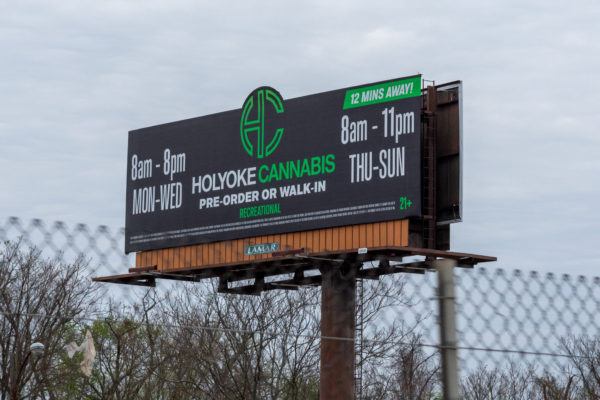Signs of the time: Cannabis billboard advertising faces restrictions
Last month, the Connecticut House of Representatives voted 98-48 to restrict advertising cannabis products and services to those who hold industry relevant licenses. The impetus for the proposed law came largely from towns along the border with Massachusetts where billboards advertising stores just over the state line have proliferated since legalization took effect in the Bay State.
“Look, I’m sick of seeing these billboards with cannabis leaves splayed all across them, within 1,500 yards across from a school or church or whatever. Can’t we do something more about that?” said Rep. Mike D’Agostino (D-Hamden) to the General Assembly’s General Law Committee earlier this year.

Despite some of the support for the bill coming from a dislike for the visibility of the industry, Fred McKinney, the principal of the economic consulting firm BJM Solutions, which counts the Alliance for Cannabis Equity (ACE) as a client, did not take issue with it.
“I don’t think that’s problematic,” McKinney, who is one of the authors of ACE’s Cannabis Manifesto for Social Equality. “Obviously if you are in the business, you have a license, it’s the only way for you to be in the business, so it’s in your interest to market your company and its products. You’re not going to want out-of-state purveyors of cannabis trying to attract cannabis customers out of the state.”
According to McKinney, the law would not pose an issue for any legal business within Connecticut. Some friction may still occur between towns that are opposed to the billboards even when advertising local businesses and licensed cannabis merchants. However, as currently worded, the bill will actually help the industry grow once the first legal recreational dispensaries open by reducing cross-border draw.
“It’s also consistent with federal law,” McKinney noted. “It’s still a federal crime to be carrying cannabis across state lines. I think you can make the case as well that this is the state telling Connecticut consumers ‘don’t cross state lines to go and buy marijuana.'”
McKinney also dismissed concerns that the bill could entirely prevent the advertising as written. Licensed companies in the state with financial backing or imported products can partner with national organizations to purchase advertising.
“Money is pretty fungible,” he said. “It’d be difficult in my view to say that this would prohibit an out-of-state company from supporting an in-state company in doing marketing like this.”
Moving forward, McKinney predicted that marijuana will be treated like other products aimed at adults.
“I think the best example would be the way you see alcohol advertised, and the way you used to see cigarettes advertised if you’re old enough to remember when you saw that,” he said. “I think there’s a legitimate state interest in curtailing some of the advertising in the industry. Even though I’m an avid supporter of legalization, I don’t want to see billboards all over the place either. There are going to be restrictions similar to that which you see with alcohol and tobacco being sold or advertised close to schools and churches.”
McKinney predicted that if federal legalization arrives, it will occur in the next five years and the cannabis industry will in short order come to resemble the alcohol industry in terms of retailing and regulations.